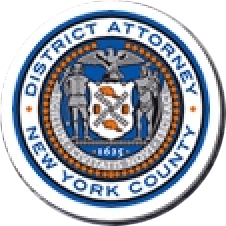D.A.’s Cybercrime and Identity Theft Bureau Shares Tips to Spot Common Scams
Manhattan District Attorney Alvin Bragg today announced that the Office has frozen more than $1.3 million in cryptocurrency during fraud investigations conducted over the past ten months. Of that, $200,000 worth of cryptocurrency was seized and is now held in the Office’s accounts. While most of the alleged suspects are overseas, the D.A.’s Office is actively working to return the stolen money and cryptocurrency to the victims.
“Using our blockchain analysis expertise, our investigators, prosecutors, and specialized cryptocurrency analysts were able to locate and freeze more than $1.3 million of stolen cryptocurrency in the past 10 months alone,” said D.A. Bragg. “While many of these cyberthieves are overseas and currently out of our reach, the cryptocurrency they stole is not. We are returning that money to the victims of these schemes – while raising awareness to prevent future fraud. I urge everyone to share these common scams with their loved ones, particularly the older people in their lives, and report any such scams to our Cybercrime and Identity Theft Hotline at 212-335-9600.”
Cryptocurrency Seizures
- In November 2021, a Manhattan resident used a fraudulent website which was designed to look like a legitimate cryptocurrency online trading platform, and subsequently lost more than $300,000 to individuals based in Turkey. The D.A.’s Office conducted blockchain analysis to track where the victim’s cryptocurrency was sent and worked with the identified exchange to freeze approximately $200,000 of the victim’s stolen cryptocurrency.
- Beginning in November 2021, a Manhattan resident and business owner was defrauded in a sophisticated cryptocurrency investment scheme based out of Nigeria. Over the course of approximately seven months, the Manhattan resident sent more than $700,000 in cryptocurrency to individuals that purported to be investors. The D.A.’s Office conducted blockchain analysis, identified the cryptocurrency exchange where a portion of the solen funds were being held, and worked with the exchange to recover more than $200,000 of the victim’s stolen cryptocurrency.
- In April 2022, a Manhattan resident received a phone call from someone claiming to be an Amazon representative investigating a fraudulent purchase. She was then transferred to another individual who claimed to be an FTC investigator who tricked her into depositing more than $700,000 in cash into Bitcoin ATMs. Other victims of this scam were instructed to download and install remote computer access software that allowed the scammers access to their online bank accounts. Using blockchain analysis and working with the bank and cryptocurrency exchanges involved, the D.A.’s Office has frozen more than $900,000 of the fraudulently obtained cryptocurrency and cash from the scammers who are believed to be operating out of India.
Tips to Spot Common Scams
Remember, legitimate bank employees, government officials, utility service providers, and corporation representatives will never ask you to:
- Share your banking or email passwords
- Send photographs of your driver’s license or passport via email or text message
- Install remote desktop software from the internet that would allow others to access and view your computer
- Make a payment to the government or bank by buying gift cards, depositing cash into Bitcoin ATMs, or opening online cryptocurrency exchange accounts
Trending Scams:
- Imposter Scams: Scammers pretend to be bank employees, government officials and investigators, utility service providers, or representatives from Amazon, Apple, anti-virus software companies like Norton, electronic payment companies such as Zelle, PayPal, and others when making contact via text message or telephone calls.
- Remote Desktop Downloads: Scammers convince their targets to download and install remote desktop viewing software so they can use the victim’s computer to access bank accounts and open cryptocurrency exchange accounts in the victim’s name while avoiding online detection.
- Bitcoin ATMS: Scammers seeking cryptocurrency target the elderly and convince them to feed cash into Bitcoin ATMs.
- Fake Account Balance Screenshots: Scammers send or display photoshopped screenshots of the victim’s bank account to convince them that there are funds in their account that do not belong to them – and that need to be “returned” to the scammer.
- Romance Scams: You may be virtually dating a scammer if your romantic interest refuses to appear on video and always seems to be traveling abroad – and frequently has financial emergencies or starts suggesting cryptocurrency investments.
These investigations are being handled by Cybercrime and Identity Theft Bureau Assistant D.A.s David Ginensky, Raphaelle Monty, Alona Katz (Deputy Bureau Chief), Robert Shull (Deputy Bureau Chief) and Jeremy Glickman (Bureau Chief). Supervising Rackets Investigator Gregory Dunlavey, Senior Rackets Investigator Thomas Piazza, Senior Cybercrime Analyst Paulina Bahary, Cybercrime Analysts Caralyn Caine and Joseph DiMiceli, and Cryptocurrency Analysts Kelly Kenny and Samuel Weaver are assisting with the investigations. Former Cryptocurrency Analyst Ryan Mullane and former Rackets Investigator George Bishai assisted with the investigations.
D.A. Bragg thanked Special Agent Jonathan Peck of the United States Secret Service and NYPD Detectives Paul Brogan and Mike Bia, who assisted under the supervision of Sergeant Robert Turbiak.
###


